
This article is more than
9 year oldMore than three years after fleeing the United States with a massive cache of top-secret documents, former National Security Agency contractor Edward Snowden remains a federal fugitive, living in Moscow courtesy of President Vladimir Putin of Russia.
But Snowden — who is the subject of a new Oliver Stone biopic that hits movie theaters next month — is making the most of his exile: Over the past year, he has collected over $200,000 in fees for digital speaking appearances that have been arranged by one of the country’s elite speakers bureaus, according to a source close to Snowden who is intimately familiar with his business affairs. At least three of these paid speeches were hosted by public American universities, and documents obtained by Yahoo News highlight various concerns raised by college officials about paying Snowden.
The former intelligence analyst uses video chat technology to address audiences around the globe: In the last five months, a larger-than-life Snowden has appeared on giant screens to a sold-out audience at the Brooklyn Academy of Music, northern Europe’s largest music festival, a symposium on surveillance and civil rights in Tokyo, and Comic-Con in San Diego. In all of these cases, as with most of his appearances, sympathetic crowds greeted him with thunderous applause and praise for his decision to leak classified documents to journalists about U.S. surveillance programs.
“Arguing you don’t care about privacy because you’ve got nothing to hide is no different than saying that you don’t care about free speech because you have nothing to say,” Snowden, using one of his classic lines, last month told the Roskilde Festival in Denmark. After the crowd — reportedly Snowden’s largest ever — sang “Happy Birthday,” the 33-year-old said: “Everyone, thank you. Really. You guys staying with me… is overwhelming. But this is not about me. This is about us.”
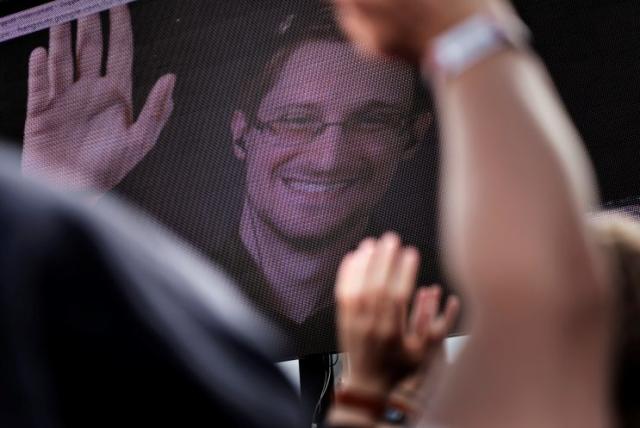
The events promote Snowden’s credentials as a whistleblower whose disclosures triggered significant changes in the U.S. surveillance laws. And they come at a crucial moment for him. Timing their efforts to coincide with next month’s release of the Stone movie about his life, Snowden’s supporters are planning a major public relations campaign this fall to petition President Obama to grant him a full pardon before he leaves office.
But the spectacle of Snowden, who stole hundreds of thousands of classified government documents, profiting from his celebrity has irked some U.S. intelligence officials. This could frustrate his supporters’ hopes — admittedly unlikely to be realized — of striking a deal with the Obama administration to allow him to return the United States without standing trial and risking substantial prison time.
“In my view, I think he has violated the oath that he made to this Constitution and this government,” said CIA Director John Brennan in a recent interview with Yahoo News. “Getting remuneration for it is very unfortunate and wrong.”
Ben Wizner of the ACLU, who serves as Snowden’s U.S. lawyer, strongly defended his client’s blossoming speaking career.
“There is nothing remotely improper about Edward Snowden making a living by speaking to global audiences about surveillance and democracy,” Wizner said, arguing that some in the U.S. intelligence community who approved torture and other abuses have “cashed in” with lucrative book deals and consulting careers. Snowden is “not getting rich off public speaking,” Wizner said. “He lives a frugal and modest life.”
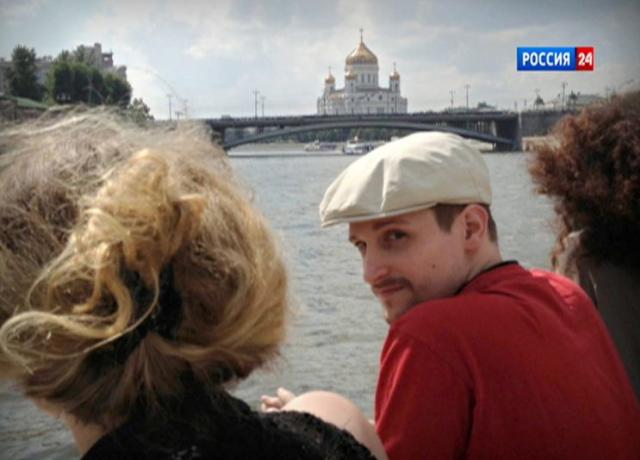
‘I can assure he will pay all taxes that he might owe’
Snowden has kept a well-crafted media profile in exile, digitally emerging more than 100 times at various events since arriving in Russia, according to a review of his public appearances. In 2014, he began appearing via video chat — or robot — at events around the world. Sometimes the American leaker-turned-activist speaks to events for free, especially for nonprofit groups, according to Wizner. In other cases, including talks at American colleges and universities, Snowden is paid as much as $25,000 for an appearance, his lawyer says.
Since September 2015, these paid talks have been arranged by the American Program Bureau (APB), a prestigious speakers bureau whose A-list clients range from world leaders such as former President Jimmy Carter and Desmond Tutu to TV stars such as Jon Stewart and Ellen DeGeneres. (Also advertised on the bureau’s website are a number of former U.S. officials, including retired Lt. Gen. Karl Eikenberry, the former U.S. commander in Afghanistan, and former State Department counter-terrorism coordinator Daniel Benjamin.) During that time, three public universities — the University of Iowa, the University of Colorado and the University of Arizona — signed contracts with the bureau for Snowden to appear, according to documents obtained by Yahoo News under open records requests.
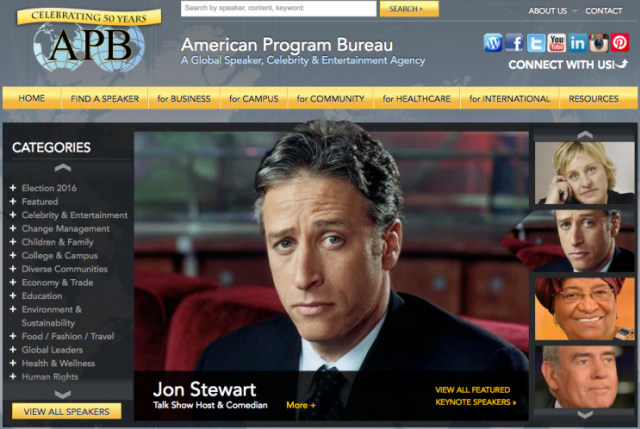
The APB does not publicize its arrangement with Snowden, omitting his name from a list of advertised speakers on its website, although its officers have signed the contracts for Snowden’s talks at the schools. The emails obtained by Yahoo News show that officials at the schools, while usually enthusiastic about the idea of having Snowden speak to their students, raised multiple questions about his appearances, including whether Snowden was donating some portion of his payments to charities or nonprofit groups, whether he was paying U.S. taxes on his fees and whether the payments might be prohibited by an executive order signed by President Obama last year declaring cyberhacking a national security threat subject to sanctions by the U.S. Treasury Department.
The bureau declined repeated requests to answer any questions from Yahoo News about its arrangement with Snowden. Wizner, Snowden’s U.S. lawyer, indicated to Yahoo News that Snowden has not filed any U.S. tax returns on his income in exile, but added: “I can assure you he will pay all taxes that he might owe. But he’s going to do that in connection with a settlement of all the charges” against him.
Snowden’s legal trouble dates back to the spring of 2013. On May 20 of that year, he landed in Hong Kong with what some U.S. officials feared was as many as 1.7 million classified documents taken from NSA systems during his work as an NSA contractor for Dell and Booz Allen Hamilton. (Exactly how much he took remains unclear.) He subsequently gave American journalists Laura Poitras and Glenn Greenwald an estimated 200,000 documents, the contents of which became the subject of hundreds of news stories detailing NSA practices, including a top-secret program to collect records of phone calls made by Americans. Snowden also provided documents to Washington Post journalist Barton Gellman and South China Morning Post journalist Lana Lam. The subsequent media reports informed the world of pervasive spying by Western governments and spurred efforts by all three branches of government to reform the U.S. surveillance apparatus.
On June 14, 2013, Snowden was charged in a Justice Department criminal complaint with theft of government property and two violations of the U.S. Espionage Act, for disclosing classified communications. Nine days later, Snowden, asserting he was on his way to Latin America, wound up at the Moscow airport and was unable to go any farther because the U.S. government had revoked his passport.
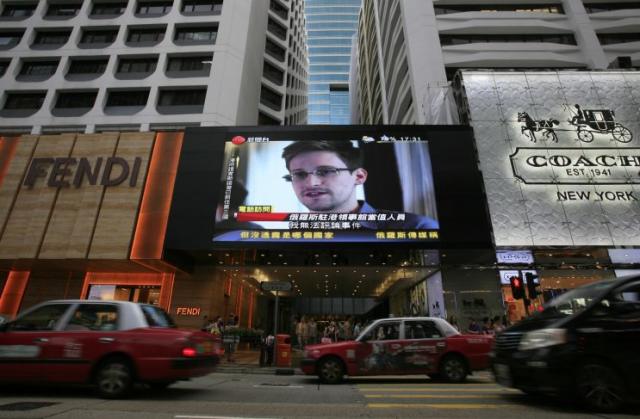
‘How much is actually donated?’
The idea for Snowden’s appearance at the University of Colorado, Boulder, arose after the APB speakers bureau emailed the university’s Distinguished Speakers Board. The chair of the board told Yahoo News that “the email was more of an advertisement-type format, just informing us that Mr. Snowden was on the speaking circuit.” The university agreed to pay the bureau $56,000 to host a joint appearance with Snowden and Pulitzer-Prize winning author and journalist Ron Suskind on February 16, 2016, for 90 minutes.
“The speaking ‘fee’ for Snowden is also a donation to a non-profit, correct?” Brandon Myers, coordinator for Student Activities + Special Events at University of Colorado, Boulder, asked APB senior agent Tammy Haschig in a Feb. 1, 2016, email. “If so, which organization? The ACLU? How much is actually donated?”
Haschig replied that Snowden “contributes a significant portion of his speaking fees to the Freedom of the Press Foundation, where he is a board member.”
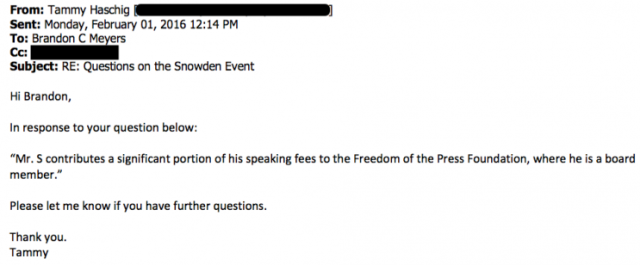
Snowden echoed the claim during his digital talk with Suskind, telling the crowd that he planned to donate part of his fee to the press organization — a San Francisco nonprofit whose stated mission is to “support and defend journalism dedicated to transparency and accountability.” Other board members of the Freedom of the Press Foundation alongside Snowden include Greenwald and Poitras, both of whom received the initial cache of NSA documents from Snowden.
“I want to make sure journalists are able to operate,” said Snowden, explaining his decision to make the donation. Suskind, whose appearance with Snowden was also arranged by APB, said that it was his “understanding” from Wizner that Snowden was going to donate half of his fee to the Freedom of the Press Foundation.
But Trevor Timm, president of the Freedom of the Press Foundation, told Yahoo News that the organization never received any direct donations from Snowden as a result of the Colorado talk or any other of his speaking appearances. On a “handful of occasions,” Timm said, Snowden has forfeited speaking fees and directed that they go to the group, estimating that the organization has received between $10,000 and $20,000 this year under such arrangements. But, he added in an email, “there have been no direct donations from Snowden to Freedom of the Press Foundation.”
If Snowden did not actually make the contribution to the Freedom of the Press foundation for the Colorado talk, then “I would be disappointed and surprised,” Suskind said in an interview.
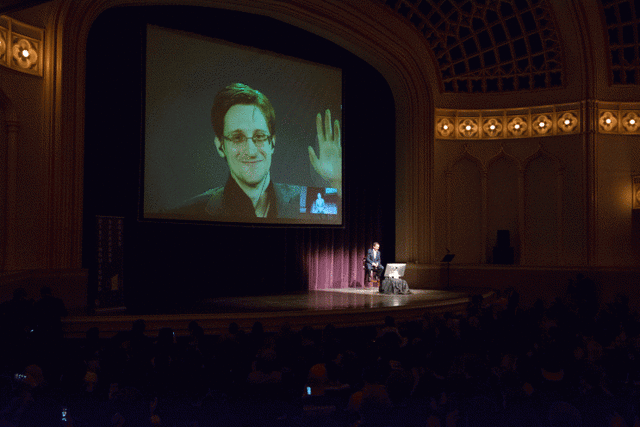
When asked about the discrepancy, a University of Colorado spokesman told Yahoo News that “Snowden and APB fulfilled their end of the contract. And we paid the specified amount to APB as outlined in the contract.” (The contract obtained by Yahoo News does not specify how the $56,000 was divided between Snowden and Suskind, or how much APB took as its fee.) Wizner said his client still intends to direct some future speaking fees to the Freedom of the Press Foundation, estimating this will amount to $50,000 by the end of the year.
‘Ed doesn’t have a clue what the LLC is’
The question of whether Snowden was directing donations to nonprofits was only one of the issues raised by school officials in preparation for Snowden’s talk. Norm Skarstad, the assistant director for the University of Colorado’s Student Organizations Finance Office, asked Haschig in an email if Snowden was paying taxes on his speaking fees. “I only ask because paying foreign nationals can be problematic for us.” Haschig replied: “This is not an issue. We are actually paying him through an LLC [a limited liability company] to streamline things.”
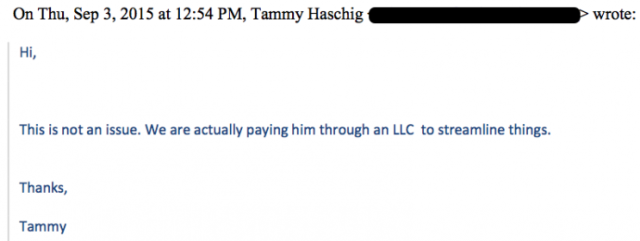
Haschig, like other APB officials, did not respond to questions about the corporation that is paying Snowden. But Wizner said he is confident that the LLC referred to in the email is not a corporation in which Snowden has any interest.
“Ed doesn’t have a clue what the LLC is,” Wizner said after consulting with his client. Before APB began representing Snowden, Wizner said he paid his client directly for his speaking engagements by wiring money to his bank account in Moscow.
In light of potential legal issues, Wizner said he assumes the LLC was set up by APB to shield the fees it pays to Snowden from the amounts it collects on behalf of other clients, presumably in case the U.S. government targets Snowden’s income.
‘Tom do we have other options or is it the last one’?
The possibility of the government targeting Snowden’s fees was raised by some university officials, who took notice of an executive order by President Obama last year aimed at thwarting “malicious cyber-enabled activities.”
“Kelly, Please hold everything,” University of Iowa Vice President for Student Life Tom Rocklin told university lecture committee advisor Kelly Soukup on Sept. 17, 2015, during final arrangements for a talk featuring Snowden. “[A] concern has been identified. Based on an executive order signed by President Obama in January, it is illegal to transfer funds to a fugitive. My understanding… is [that] unless we can have an assurance that no funds will be transferred to the speaker we cannot have him.”
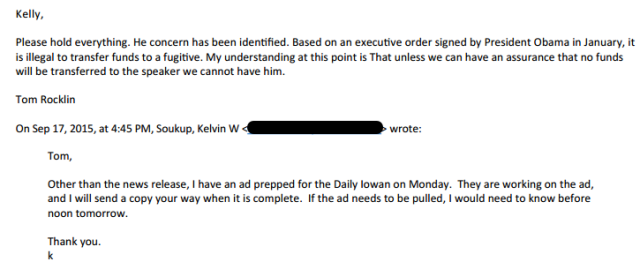
The executive order, signed in April 2015 and referenced in subsequent emails, imposes financial sanctions against anyone found to be directly or indirectly involved in cyber-related activities deemed to be “a significant threat to the national security, foreign policy, or economic health or financial stability of the United States.”
On Sept. 18, the University of Iowa withdrew the $3,000 offer to host Snowden at the talk, which also featured former CIA analyst Ray McGovern and former FBI agent Coleen Rowley. Three days later, after speaking with Wizner, Soukup emailed Haschig: “Wait! We may have some hope!” Soukup then explained to his colleagues that according to Wizner, “the interpretation of the executive order is incorrect. He indicated that Snowden is not on the list at the Dept. of Treasury for those who are impacted by the order.”
In fact, as Wizner pointed out to Yahoo News, the Treasury Department had yet to designate any violators who might be subject to financial sanctions. Asked if Snowden could potentially be subject to sanctions in the future, a Treasury Department spokeswoman replied by email: “Treasury does not speculate on any potential future actions.”
As of Sept. 24, four days before the event, Iowa lawyers still wondered if a payment to Snowden “falls under the umbrella of donation that is restricted [no] matter how it reaches him.”
Rocklin subsequently asked if the university could pay for the appearances of Rowley and McGovern instead of Snowden. The nonprofit Veterans for Peace agreed to pay for Snowden, but Snowden didn’t “want to take money from Vets for Peace,” according to Soukup.
“The deal to have the veterans pay for the speaker has fallen through,” Rocklin emailed then-interim university president Jean Robillard, conspicuously avoiding Snowden’s name at that point. “Are you still comfortable with paying the speaker using foundation funds?”
“Tom do we have other options or is it the last one”?
“Last one I can identify.”
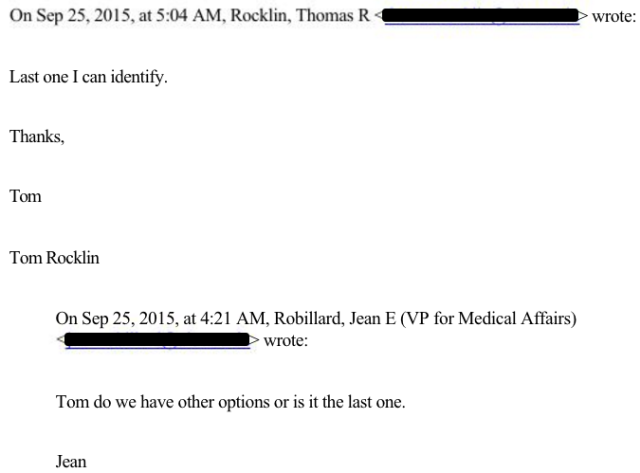
After Robillard decided to use funds from a University of Iowa foundation account, Rocklin told other Iowa staff: “FYI. We’re back on with the speaker we discussed.”
“SNOWDEN IS A GO!” Soukup subsequently emailed to the venue. “As they say: ‘better late than never!’” When asked about the deliberations about hosting Snowden, Iowa University spokeswoman Jeneane Beck told Yahoo News in an email: “The University of Iowa values intellectual debate and believes in providing students the opportunity to hear from speakers with diverse viewpoints.”
She added: “However, as a public institution, we are careful to follow all state and federal guidelines, so it was important to do our due diligence when hosting Mr. Snowden.”
After the event, which was deemed a huge success, Haschig told Soukup that “I’m sure [Snowden] would appreciate if you kept the fee confidential as he did this more as a favor to colleagues. We wouldn’t want other clients feeling as though they were being over charged as I’m sure you can understand!”
The most recent paid Snowden appearance at an American university occurred at the University of Arizona on March 25, 2016. The school paid APB $20,000 for Snowden to digitally appear for a talk with Greenwald and prominent linguist-turned-activist Noam Chomsky (who spoke for free).
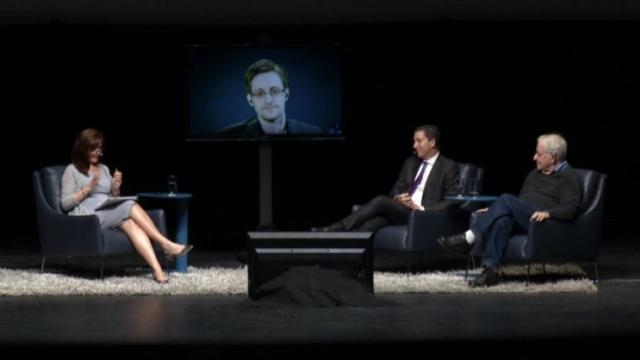
‘The pardon power exists’
How Snowden has made money in exile has been an open question from the beginning. Snowden claimed that he withdrew “enough financial resources to survive on my own for years without anyone’s assistance” before leaving the United States with classified documents. Nevertheless, while settling into asylum, the former systems administrator accepted a job at a major Russian website, according to his Russian lawyer Anatoly Kucherena. And by November 2013, the American was reportedly almost broke. “The savings he had, he has almost entirely spent on food, rent, security and so on,” Kucherena told the Russian newspaper Rossiiskaya Gazeta. As of February 2015,according to Kucherena, Snowden was “still working for a Russian company.”
But by mid-2015, according to Wizner, speaking fees that sometimes exceeded $10,000 were his primary source of income. The APB organized its first Snowden event in September of 2015, speaking to an invitation-only “investors forum” sponsored by a Chinese brokerage firm in Hong Kong.
Snowden has appeared in about 25 interviews and appearances so far in 2016 and isreportedly scheduled for more. He has supplementing his public profile with a Twitter account; he now shares his riffs on world events with his 2.1 million followers.
Through tweeting regularly, Snowden burnishes his credentials as a privacy advocate. In June, Snowden criticized a “Big Brother” surveillance law passed in Russia. In July, he appeared to chastise WikiLeaks for publishing personally identifiable material in leaked documents related to the Democratic National Convention.
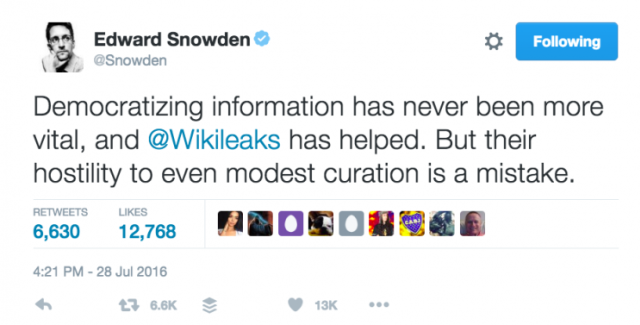
When asked about his life in Russia at the Brooklyn Academy of Music in March 2016, Snowden replied that he lived an ordinary life in “an apartment like anybody else’s.”
He continued: “My physical location is different, but that’s not new for me. I worked for the CIA, under cover, overseas, in Switzerland and other places. I worked for the NSA as a contractor in Japan and other places. And so having a foreign posting where I have to live in a country that I don’t plan to stay in for the rest of my life to pursue work on behalf of my own country is really nothing new for me. I do have a normal life, I do all of my own shopping, I ride the subway like everybody else.”
At this point, more than three years and many revelations later, Snowden’s backers are aiming at a full pardon. According to Wizner, they are creating a new nonprofit organization that will promote the cause starting this fall, after the Stone movie is released on Sept. 16. Among the advisers to the campaign, he said, is veteran liberal public relations executive David Fenton.
The basis for the campaign, Wizner said, is that Snowden “has really made a significant contribution to a global conversation about open societies at a time when open societies are under threat around the world.” As a result of Snowden’s disclosures, he added, “we’ve had an historic debate about surveillance and democracy and the most significant legal reforms since the 1970s — none of which would have occurred without Snowden.”
‘I would only support his coming back and facing the charges’
But arguments for clemency are not likely to sit well with U.S. intelligence community officials, who continue to argue that Snowden’s disclosures endangered national security by alerting terrorist groups, including the Islamic State and al-Qaida, to ways they could evade U.S. surveillance, accelerating their move to encrypted communications.
“You’ve seen al-Qaida expressly, for example, reference the [Snowden] disclosures,” said NSA Director Admiral Michael Rogers about Snowden’s disclosures in an interview with Yahoo News earlier this year. “You’ve seen groups — ISIL does the same — talk about how they need to change their discipline, need to change their security as a result of their increased knowledge of what we do and how we do it.”
In early 2015, an ISIS-affiliated group used clips of “Citizenfour,” the Oscar-winning documentary about Snowden, to make a 13-minute propaganda video titled “The Electronic War and the Negligence of the Supporters of Mujahedeen.” At the end, the film points viewers to more than 20 tutorials and several online manuals detailing encryption and information security.
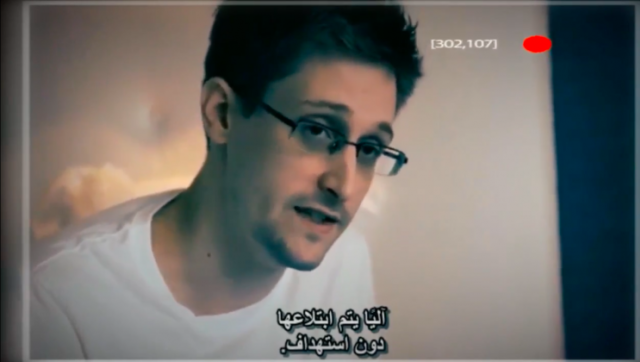
And while many experts have argued that the movement toward encryption is the inevitable result of evolving new technologies, Rogers pointed to Snowden.
“No one should doubt for one minute there has been an impact here,” Rogers said. “I will leave it to others to decide right, wrong, good or bad. But there shouldn’t be any doubt in anybody’s mind that there has been an impact as a result of these disclosures.”
“I respectfully but vehemently disagree with the former attorney general,” Brennan said in his interview with Yahoo News. “I would only support his coming back [to the United States] and facing the charges that have been levied against him and to let a court of law determine his fate.”
Wizner, for his part, doesn’t dispute that his client violated federal law by stealing and disclosing NSA documents. “The argument is not that he didn’t break the law,” he said. “The argument is that the president should use his discretion [to pardon Snowden] just as he used his discretion not to investigate and prosecute members of the intelligence community [who] broke the law” by engaging in torture and other illegal activities.
Asked whether President Obama would be open to considering a request to pardon Snowden, White House spokesman Edward C. Price replied by email: “When it comes to Edward Snowden, our position has not changed. Mr. Snowden is accused of leaking classified information and faces felony charges here in the United States. As such, he should be returned to the U.S. as soon as possible, where he will be accorded full due process.”
Daniel Klaidman contributed to this report.